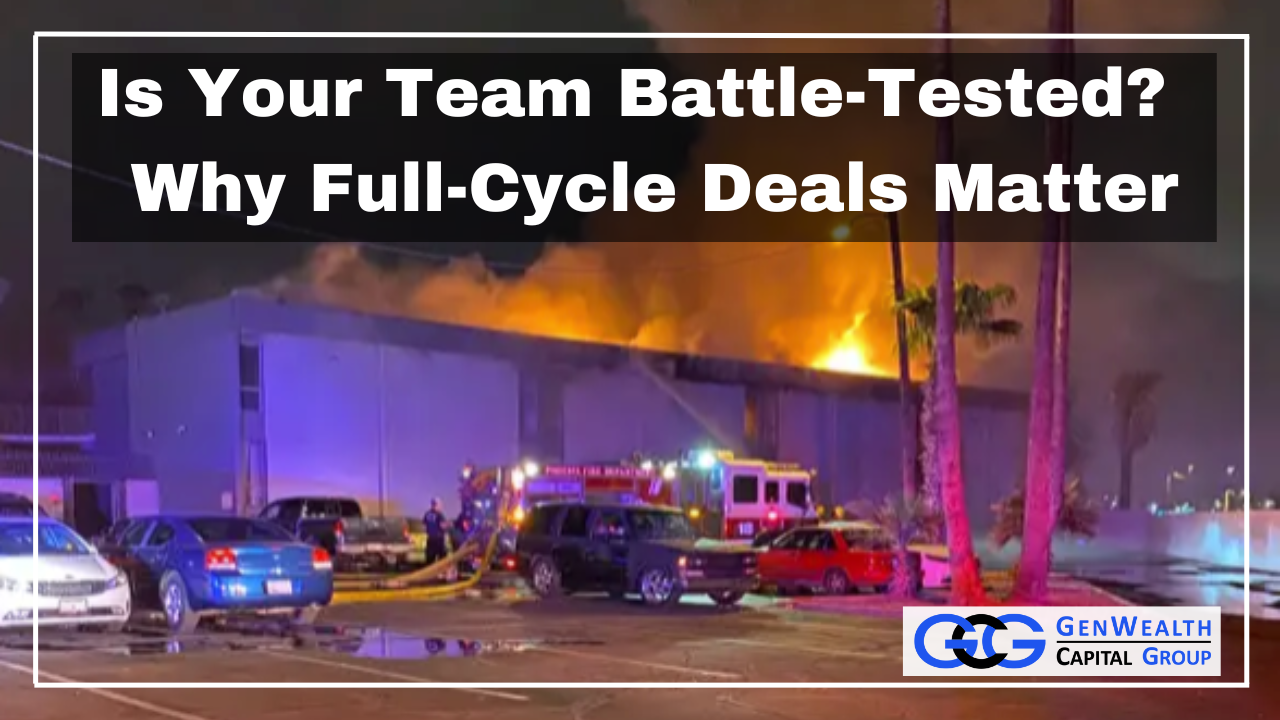Going full-cycle on a real estate deal is an important milestone. It shows that team members have taken a property to the finish line from purchase to sale, implementing a business plan, and overcoming challenges along the way.
There is nothing passive about operating large assets. During a multi-year hold period, a team will encounter challenges such as fires, non-paying tenants, leaks, over-budget projects, interest rate swings, and labor shortages. In some cases, a team may experience all of these challenges simultaneously.
Passive investors should understand the significance of going full-cycle when vetting teams to invest alongside. Below is a description of the four phases of a full-cycle real estate deal, along with potential challenges operators face during each.
1- Finding a deal and creating a business plan
In order the buy a good deal, investors have to find a good deal. To achieve this, investors need deal flow, which I’ll define as a steady stream of investment opportunities to consider. Building deal flow from brokers and sellers and analyzing these opportunities is time-consuming.
In addition to analyzing financials, operators must tour the property and obtain quotes from property managers, contractors, and debt and insurance brokers to create a business plan and budget.
Challenges operators face during this phase include:
- Managing deal flow promptly
- Accurate analysis
- Obtaining timely vendor quotes
- Competition
- Receiving accurate debt quotes from lender
2- Acquisition of the property
The clock starts ticking when the purchase and sale (PSA) agreement is signed, marking the beginning of due diligence (DD). Operators often place non-refundable risk (hard) capital after signing the PSA, which contractually states the transaction must be closed within an agreed-upon timeline. During this period, vendors enter the property for inspections and examine property financials and leases. Sponsors also fine-tune budgets and construction quotes.
Perhaps most important during the acquisition process is shoring up committed financing for the transaction. As interest rates have risen over the last several months, lenders have re-traded or adjusted terms and backed out of commitments.
General Partners market the opportunity to passive investor partners during this phase as they raise capital to close the transaction.
Challenges operators face during the acquisition phase include:
- Lenders changing or backing out of financing commitments
- Inability to raise capital from passive partners
- Finding hidden/unknown over-budget items during inspections
- Losing risk capital
3- Operations
After a sponsorship team buys an apartment complex, they must hit the ground running. Operations consist of implementing a value-add business plan to increase the asset’s income and boost operational efficiencies. This plan often includes renovations, adding amenities, and removing non-paying tenants.
Ongoing monitoring of property financials and key performance indicators (KPIs) assists in adjusting the business plan accordingly.
Challenges deal sponsors face during operations include:
- Non-paying tenants
- Labor shortages
- COVID-19
- Increased material costs
- Disasters – fires, floods
- Interest rate increases on floating debt
- Unanticipated deferred maintenance
- Changes in macro or microeconomic conditions
4- Disposition or Sale of the property.
When business plan objectives are achieved, a sale of the property may be the best action plan. General Partners will obtain a broker’s opinion of value (BOV), the broker’s price estimate for the asset.
During the sales process, sponsorship teams assist brokers in ensuring the transaction goes smoothly. Partners will review offers and select the buyer they feel can close at the negotiated price.
Upon completion of the sale, operators return investor capital, distribute profits, close out remaining accounts payable balances, and dissolve the entity used to purchase the asset.
Challenges endured during dispositions include:
- Lenders changing debt terms
- Unknown major maintenance items discovered on inspection
- Changes in macro or microeconomic conditions
- Buyer’s inability to perform on negotiated contract
- Prepayment penalties
Conclusion:
Experience matters! Investors will face challenges when purchasing, operating, and selling commercial real estate assets. Having team members that have taken assets full-cycle, overcoming these challenges is invaluable.

